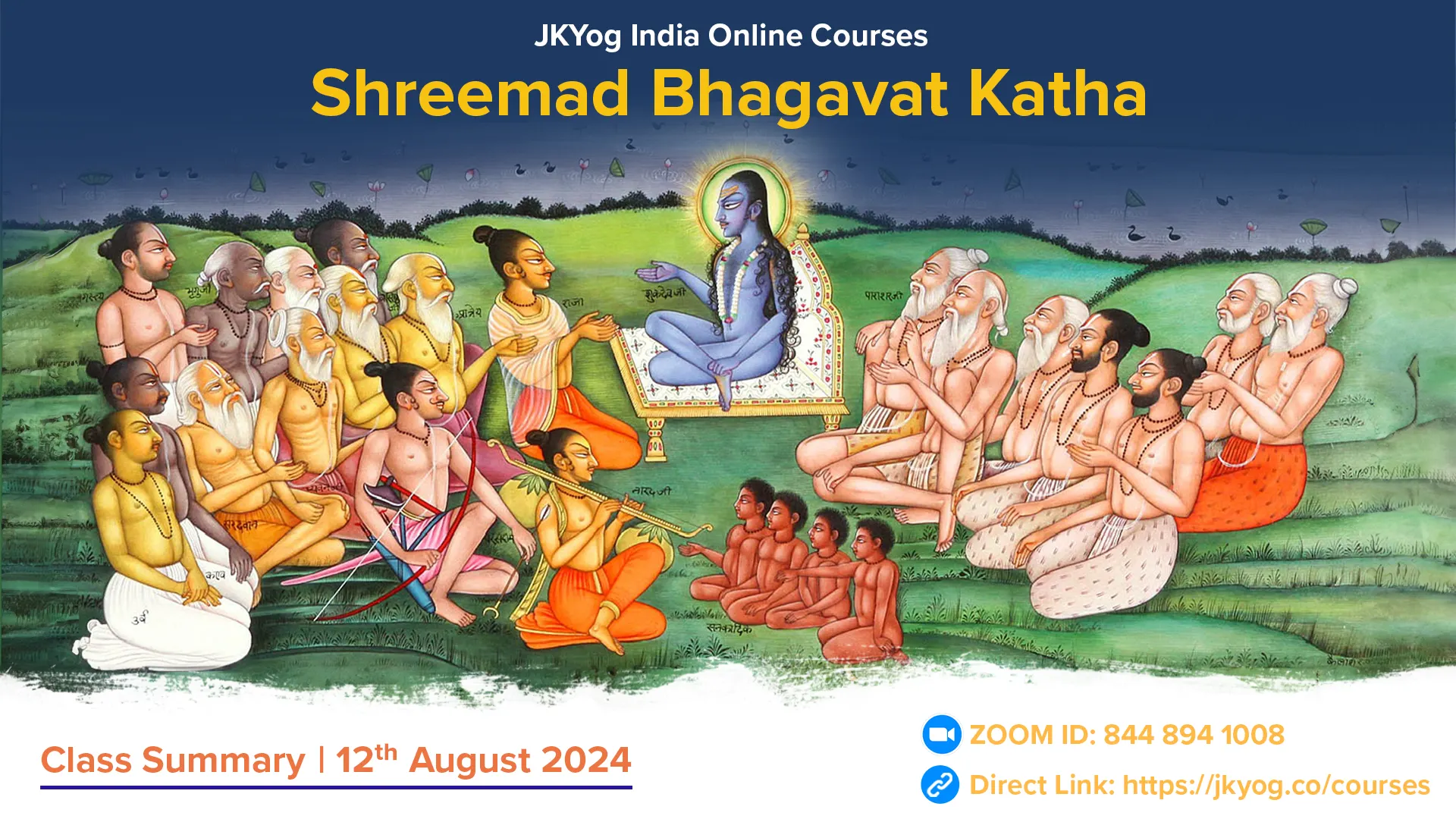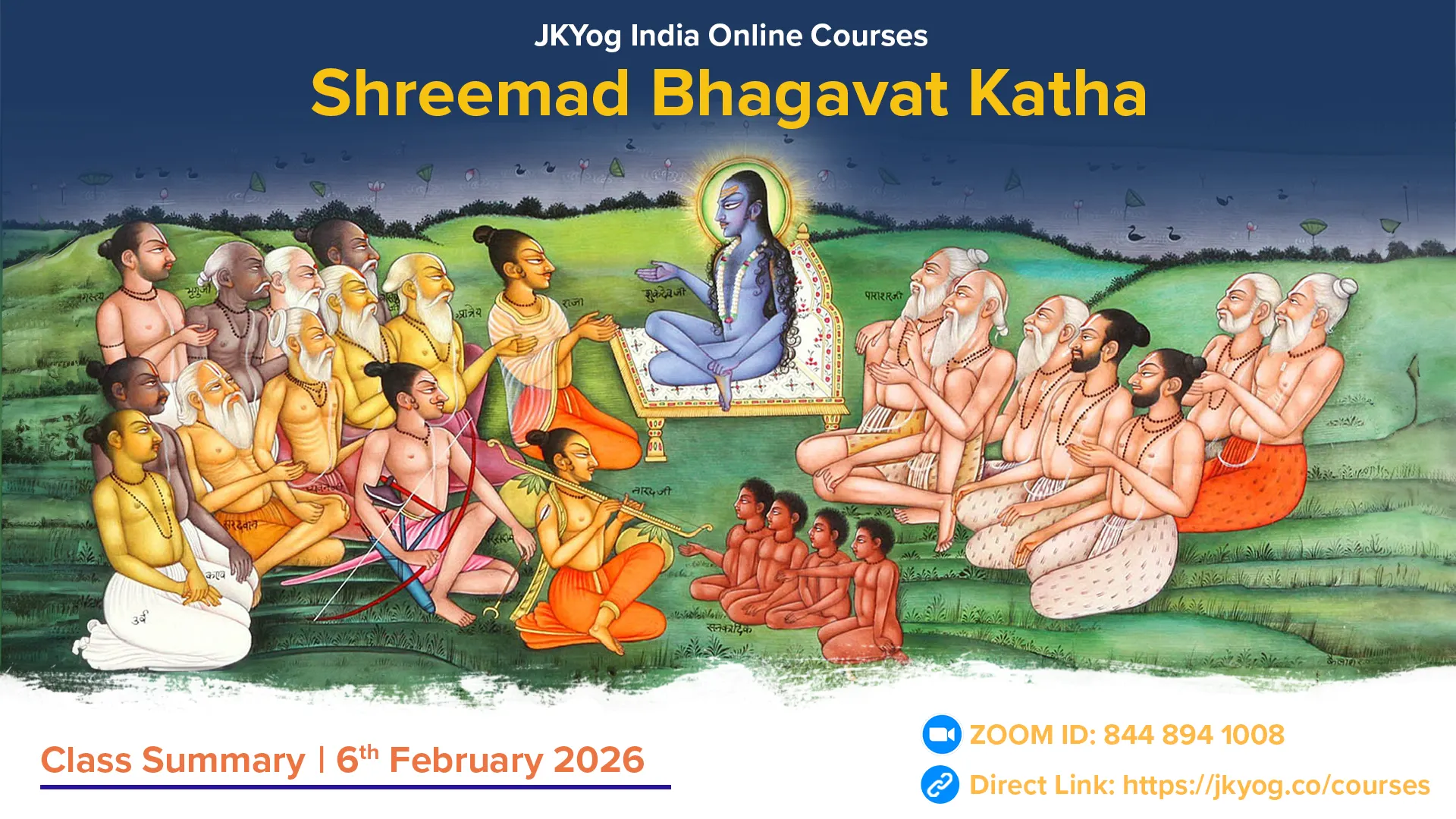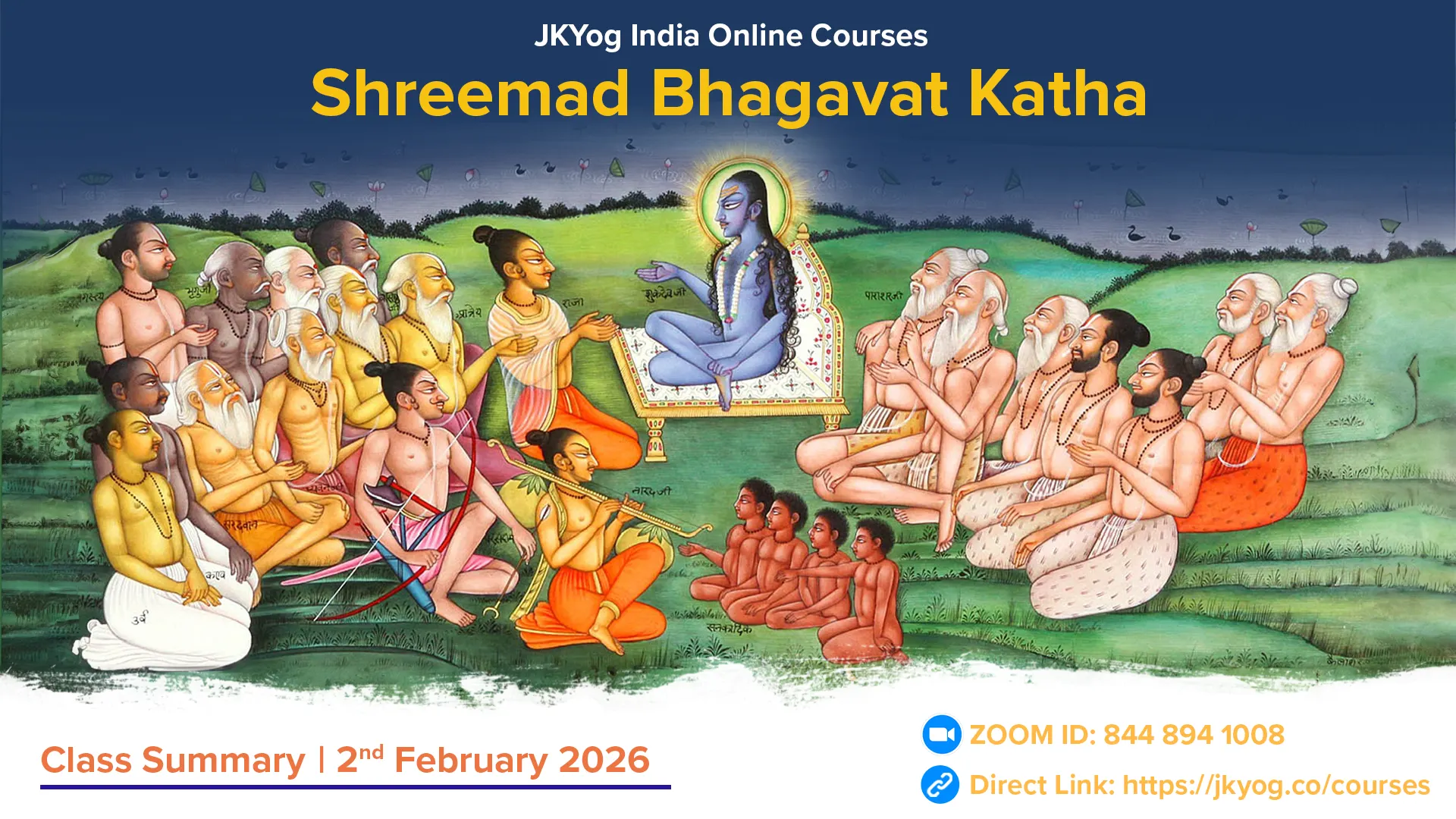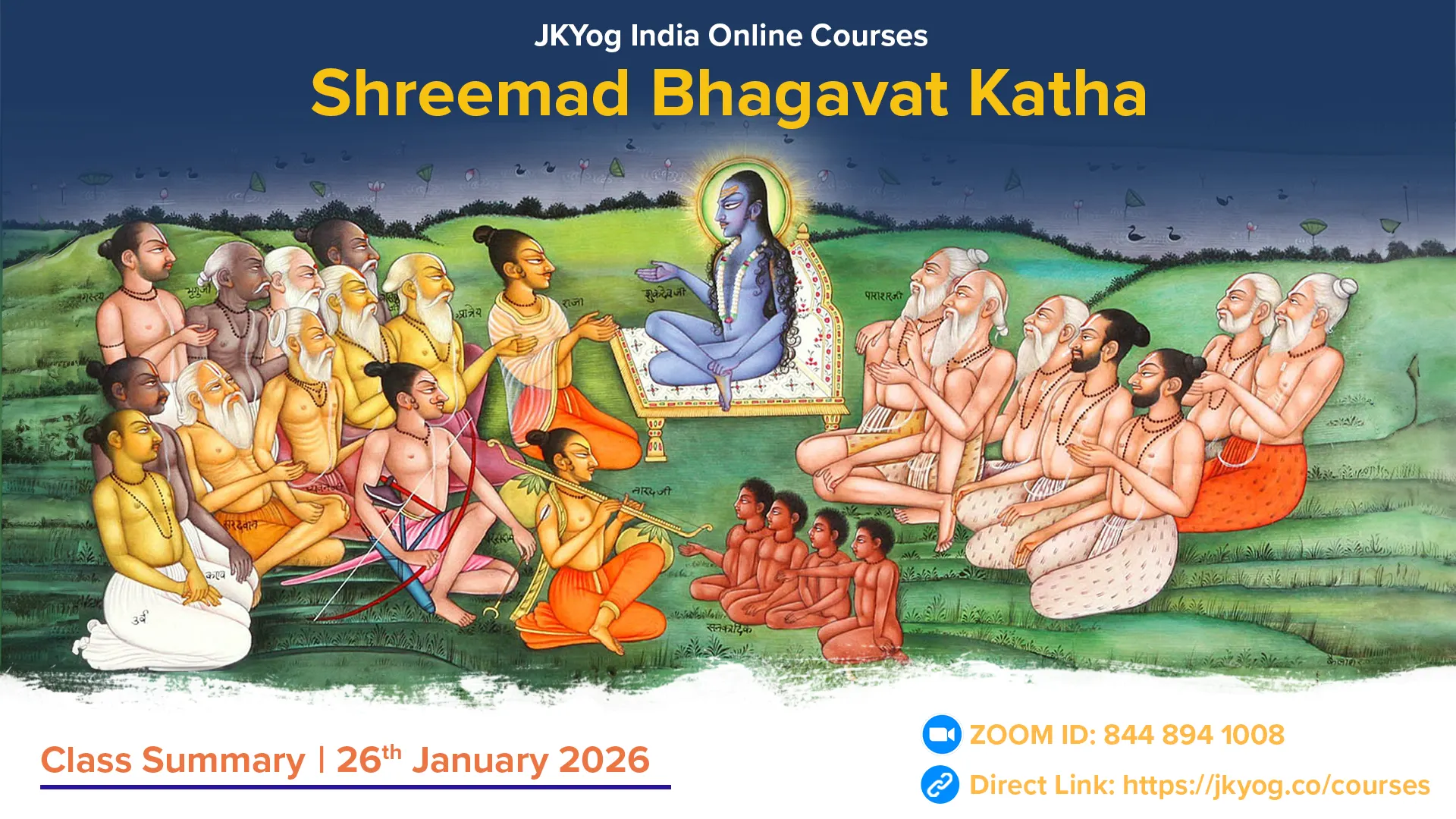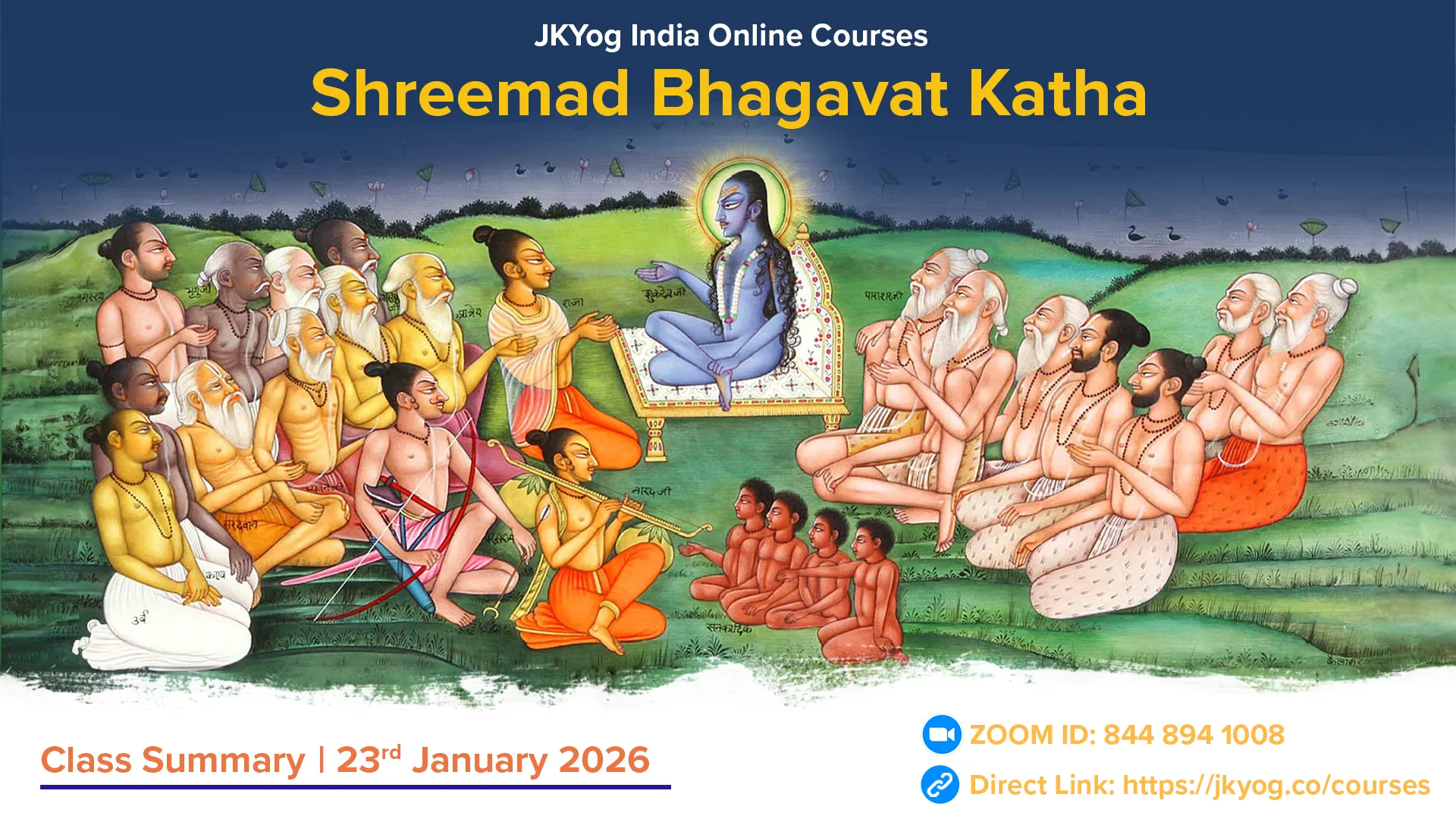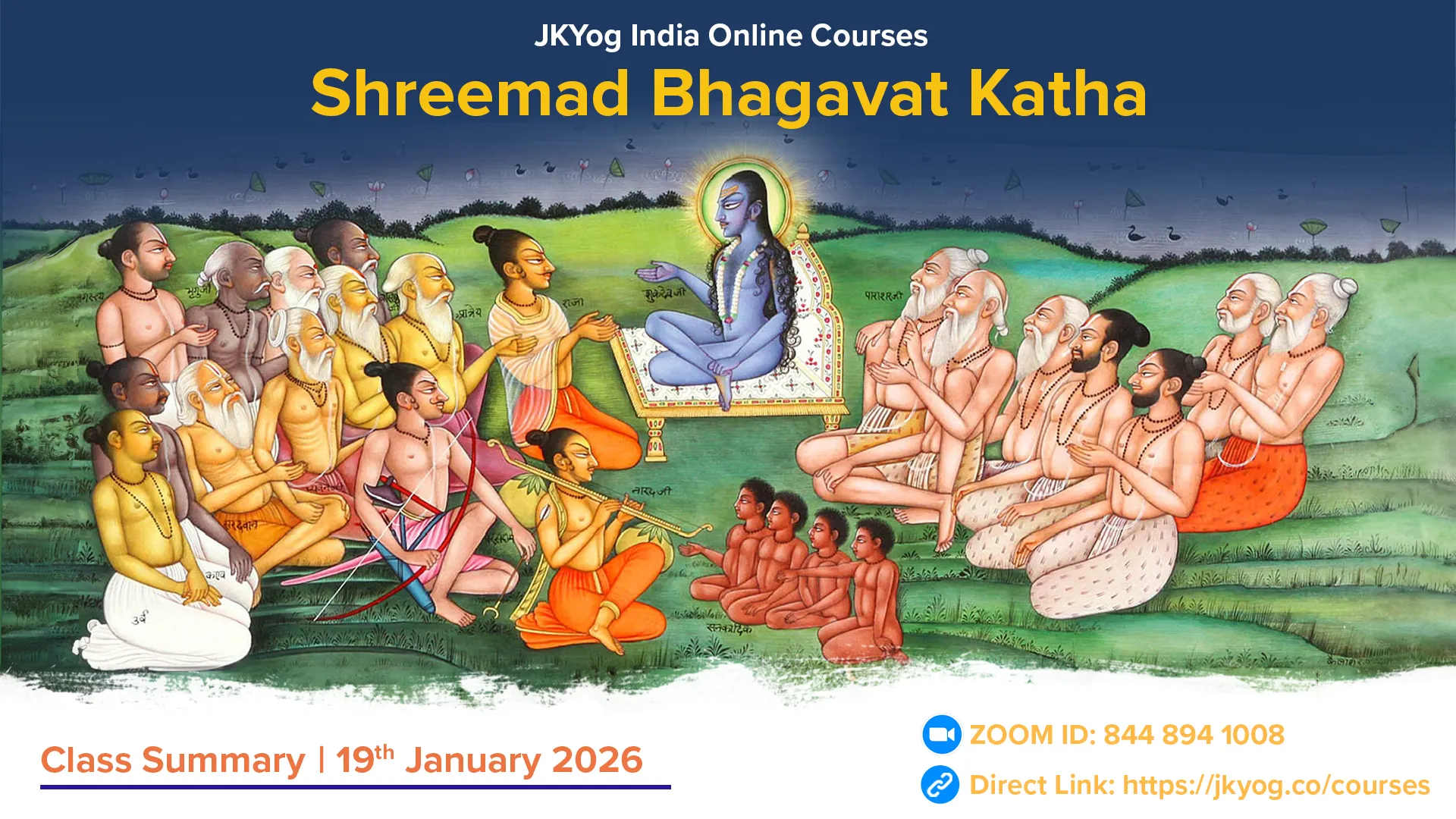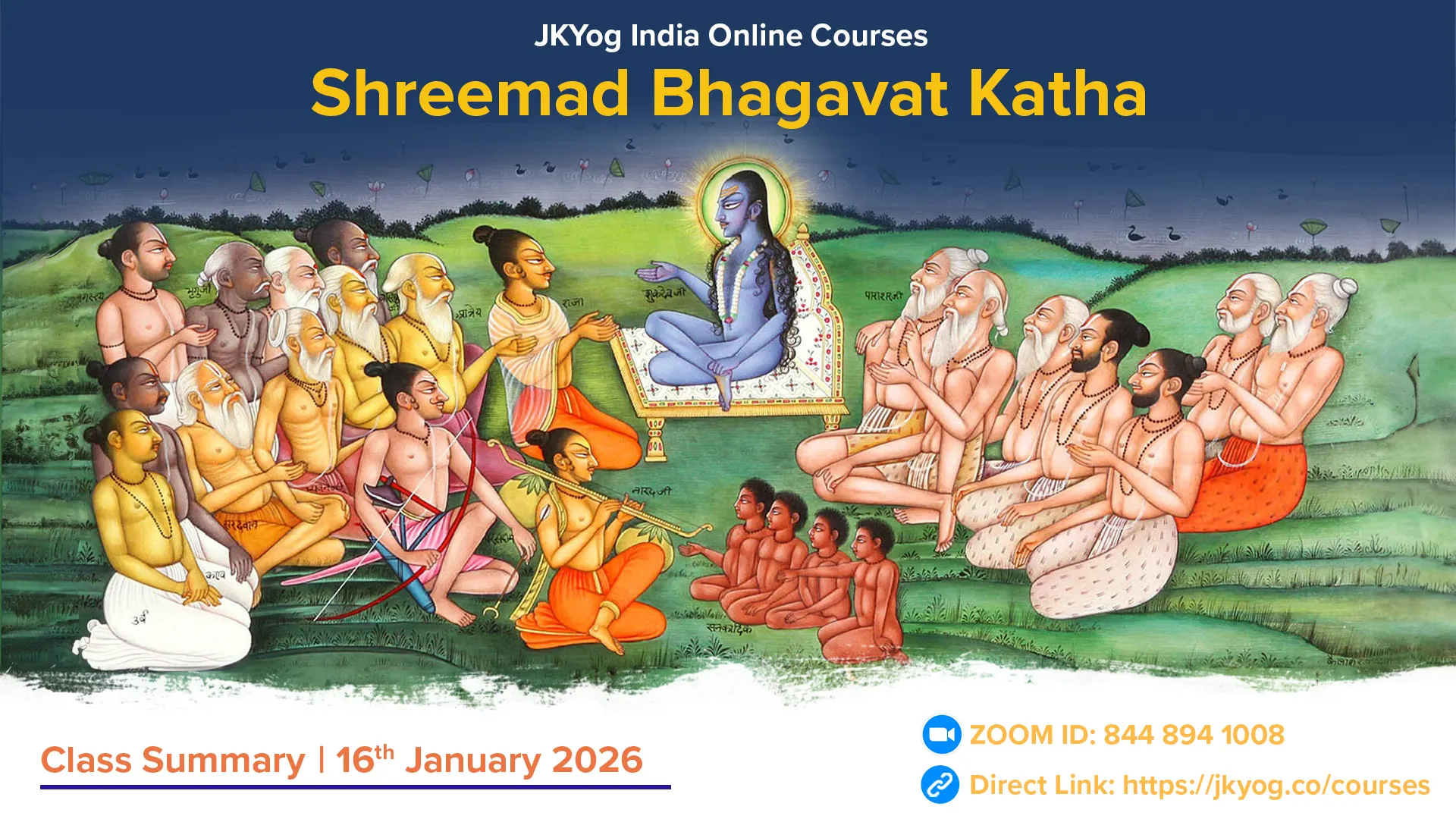Shreemad Bhagavat Mahapuran- Canto: 2, Chapters: 4 & 5
Shukadevji's words, filled with the essence of divine knowledge, inspire King Parikshit to offer his pure intellect with unwavering devotion at the feet of Bhagwan Shree Krishna. Due to his continuous engagement in worldly affairs, King Parikshit developed a deep attachment to his body, wife, sons, wealth, relatives, and invincible kingdom. However, recognising the imminent approach of his death, King Parikshit renounces all duties related to dharma (righteous duty), artha (wealth), and kama (desires). With firm determination and deep devotion, he goes to Shree Shukadevji to listen to the glories of Bhagwan Shree Krishna. King Parikshit asks Shukadevji, "O revered sage, you are supremely pure and omniscient. Whatever you say is true and appropriate. As you continue to describe the divine stories of Bhagwan, the veil of my ignorance is being lifted." With these words, Parikshit presents his questions before Shukadevji:
- How does God create this universe through His maya?
- How does God protect this world, and ultimately, how does He dissolve it?
- How does God, endowed with infinite power, utilise various energies?
What does God do?
After hearing Parikshit's questions, Shukadevji begins his discourse by offering prayers to Bhagwan Shree Krishna. He says:
- Supreme God assumes the forms of Brahma, Vishnu, and Shankar to perform the divine acts of creation, preservation, and destruction, accepting the three energies of sattva, rajas, and tamas. These energies dwell within all beings, both animate and inanimate, in an all-pervading manner. God's nature and the path to attaining Him are beyond intellectual comprehension; He is infinite, and His glory is boundless.
- God alleviates the sufferings of pure souls and bestows His love upon them. He halts the worldly progress of the unrighteous and grants liberation to those in the highest state of renunciation, for all beings, whether conscious or unconscious, are manifestations of God Himself. Thus, He shows no partiality towards anyone. However, Bhagwan Shree Krishna deeply loves His devotees and remains beyond the reach of those who engage in severe austerities without devotion.
- The wise, who take refuge at His lotus feet, easily attain the supreme state of Brahman by removing attachment to this world and hereafter from their hearts. Even the learned, the ascetics, and the virtuous do not achieve ultimate welfare until they surrender their practices and themselves at His feet.
- God is the soul of the Gyanis, the master of Bhakts, the embodiment of the Vedas for Ritualists, the symbol of dharma for the Righteous, and the essence of austerity for ascetics. Great deities like Brahma and Shankar meditate on His form with pure hearts and are amazed by His divine nature. He is the consort of Goddess Lakshmi, the enjoyer and bestower of the fruits of all sacrifices, the protector of beings, the indweller of all, the sustainer of all worlds, and the lord of the Earth.
At the time of creation, God inspired the Goddess of Knowledge to awaken the memory of the previous kalpa within the heart of Brahma, and from Brahma's mouth, the Vedas emerged. God, who is present as the soul within all beings, creates various bodies from the five elements and dwells within them as the individual soul. Accompanied by the five senses, five organs of action, five vital airs, and the mind, He partakes in the enjoyment of the sixteen objects of sense gratification.
Dialogue between Naradji and Brahma on Creation
Shukadevji says that Brahma first imparted all this knowledge to Naradji when he asked these questions, which Brahma himself had received from the Supreme God. Naradji asked Brahma, "Father! You are not only my father but also the father of all and the supreme creator, superior to all the gods. I bow to you. Please grant me the knowledge that leads to self-realisation."
Naradji then asked Brahma the following questions:
- What are the characteristics of this world?
- What is its foundation?
- Who created it?
- Into what does it dissolve?
- Who controls it?
- And what is its true nature?
Naradji further said, "You know everything because you are the master of all past, present, and future events. This entire universe is within your knowledge, just as a gooseberry lies in the palm of one's hand."
- From where did you obtain this knowledge?
- On what are you based?
- Who is your Guru?
- And what is your true essence?"
Praising Brahmaji, Naradji said, "Just as a spider effortlessly spins a web from its mouth and plays within it, in the same way, you, relying on your powers, create beings within yourself, yet remain unaffected by it. In this world, among all that is known by name, form, and qualities, I do not see any entity, whether existent, non-existent, superior, average, or inferior, that has been created by anyone other than you.
Despite being the master of all, you engaged in intense penance with a focused mind. This makes me wonder if there is someone greater than you, filling me with confusion and doubt. You are all-knowing and the supreme ruler. Please kindly explain everything I am asking so I can fully understand your teachings."
The Supreme God is the Cause of all Causes
Upon hearing Naradji's questions, Brahmaji acknowledged that until one truly knows Bhagwan, it may seem as though everything is done by Brahma alone. Just as the sun, fire, moon, planets, stars, and constellations are illuminated by the light of God, Brahmaji is also illuminated by the self-illumination of the Supreme God. Brahmaji bowed to Bhagwan Vasudev and meditated upon Him, whose extraordinary maya confounds people and causes them to see Brahmaji as the teacher of the world. This maya cannot stand before God and retreats from a distance. Yet, ignorant people are deluded by this maya and claim, "This is I, this is mine." Matter, actions, time, nature, and living beings are not separate from the Supreme God.
Narayanapara veda deva Narayan-anga-jaah
Narayanapara loka Narayanapara makhah
Narayanaparo yogo Narayanaparam tapah
Narayanaparam jnanam Narayanapara gatiih
The Vedas are devoted to Narayan. The deities are also conceived as parts of Narayan, and all yajnas are performed to please Narayan. The worlds attained through these yajnas are also conceived in Narayan.
All types of yoga aim to attain Narayan. All penances lead towards Narayan, and Narayan is also known through knowledge. The ultimate goal and means of all practices culminate in Bhagwan Narayan. (Bhagavat 2.4.15/16)
Brahmaji says, "Although Bhagwan is the watcher, He is also the supreme deity and master. Despite being unaffected, He embodies all forms. He has created me, and inspired by His vision, and I perform the act of creation according to His will."
God is beyond the qualities of maya and is infinite. For creation, preservation, and dissolution, the three gunas—rajas (passion), sattva (goodness), and tamas (ignorance)—are accepted by Him through maya. These three gunas, taking support from material, knowledge, and action, bind even the eternally liberated soul, who is beyond maya, with the illusion of action, cause, and doership. Being transcendental to the senses, God covers His true nature with these three layers of gunas; thus, people cannot recognise Him. He is the sole master of the entire universe and of me (Brahma) as well.
Sequence of Creation Expansion
Brahmaji explains to Naradji that Bhagwan, the master of maya, desired to transform from singularity to multiplicity and accept Kaal (time), Karma (action), and Swabhav (character) through His maya.
- Kaal: It stirred the three gunas—rajas, sattva, and tamas.
- Swabhav: It transformed these gunas.
- Karma: It gave birth to the mahat-tattva (great principle).
As rajas and sattva increased, disturbances arose in mahat-tattva, leading to the predominance of tamas and forming ahankara. The three primary forms of ahankara are:
- Vaikarika: Related to knowledge power. From Vaikarika ahankara, the deities of the mind and ten senses emerged. Their names are- Disha, Vayu, Surya, Varun, Ashvini Kumaras, Agni, Indra, Vishnu, Mitra, and Prajapati.
- Taijas: Related to action power. From Taijas ahankara, the five sensory organs (hearing, touch, sight, taste, and smell), five organs of action (speech, hands, feet, anus, and reproductive organ), intellect (representing knowledge power), and prana (representing action power) were created.
- Tamas: Related to material power. From Tamas ahankara, the five great elements (Pancha Mahabhuta) emerged:
- Akasha (Ether): Its primary quality is sound.
- Vayu (Air): Its quality is touch.
- Agni (Fire): Its primary quality is form.
- Jala (Water): Its quality is taste.
- Prithvi (Earth): Its quality is the smell.
When these five elements—senses, mind, and guns—were organised, the body was created. The Brahmand (cosmic egg of the universe) remained lifeless for a thousand years, after which the Supreme God infused it with life.
Summary: JKYog India Online Class- Shreemad Bhagavat Katha [Hindi]- 12.08.2024

